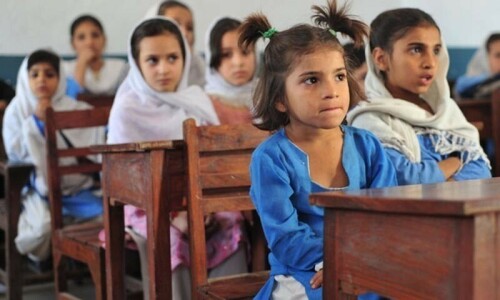
ISLAMABAD: Speakers at a conference held in connection with the International Day of Mother Language on Tuesday stressed the need for preservation and promotion of all endangered languages.
There are 6,000 languages in the world but only 250 of them have more than one million speakers. As many as 3,000 languages have less than 250 speakers.
The process whereby languages are disappearing is an unbridled one and not a new phenomenon. However, the past 30 years or so have seen a dramatic increase in the disappearance rate of languages.
The ‘national language conference’ was organised by the National Language Authority and Sindhi Adabi Sangat (SAS).
Member National Assembly Nawab Yousuf Talpur, Secretary General SAS Mushtaq Phull, Prof Jami Chandio of Allama Iqbal Open University, Pashto writer Abdullah Jan, Sarwer Sindhi and others spoke on the occasion.
They said at the primary level only mother language should be used to educate children because they understand their mother languages more easily.
Besides, an interactive dialogue ‘safeguarding mother tongues in an era of imperialist globalisation’ was also held at Shakaparian under the aegis of Rural Development Policy Institute and Lok Virsa.
Faridullah Khan, federal secretary, ministry of national heritage and integration, was the chief guest on the occasion. Speaking on the occasion, he said his ministry would ensure assistance for the revival and preservation of all endangered languages.
Lok Virsa’s executive director Khalid Javaid, Ahmed Saleem, Dr Khadim Hussain, Saeed Bhutta, Iqbal Hyder, Karim Johar, Dr Nadeem Omar, Dr Hummera Ishfaq and Mazhar Arif also spoke on the occasion.
They stressed the need for preservation of all indigenous languages spoken in the country.
CHAKWAL: Experts at an interactive dialogue organised by Centre for Rural Development and the Rural Development Policy Institute said a true democratic Pakistan can emerge only if the linguistic diversity of the country was respected and all major languages were given the status of national languages.
The participants of the dialogue, “Linguistic diversity and democratic federalism in Pakistan,” reflected on the language controversy in former East Pakistan that ultimately led to the dismemberment of the country.
“The idea of federation is that the four brothers decide to live in one premises and not that a premises is first selected for them to live in,” said Prof Tariq Mehmood, who teaches political science at the Government Postgraduate College Chakwal.“We don’t have a universal definition of federalism but the very idea of one national language for such a diverse country as Pakistan is least desired,” he said.
Prof Naeem Shahid, the head of Urdu Department at the same college, observed: “There is more than one national language but it’s sad that we never appreciated this fact. Our obsession with imposing one language at the cost of the rest has mortally affected our creativity in literature, science and market.”
Sada Hussain, a professor of English literature, said language can never be inherited. “If a child born of Punjabi parents is reared by a Japanese couple he will seldom know his mother tongue unless conscious efforts are made to teach him his mother language,” he maintained.
The speakers observed that languages were promoted through culture, jobs and creation. “Punjabi is being demoted systematically at all these levels. The current script of Punjabi cannot covey the full expression that this fertile language is capable of.”
They emphasised that Punjab Assembly at least should adopt Punjabi as its working langue. The time has now come to change the mentality of Punjabi mind. “The recent resolution on Balochistan in the US Congress is being viewed differently by people of Punjab and Balochistan. Why is it that? What have we missed to make our country a democratic federal unit” asked Prof Tariq.













































Dear visitor, the comments section is undergoing an overhaul and will return soon.